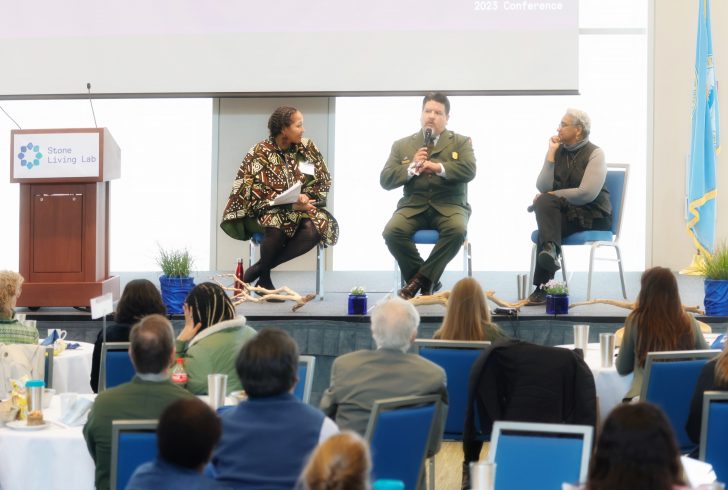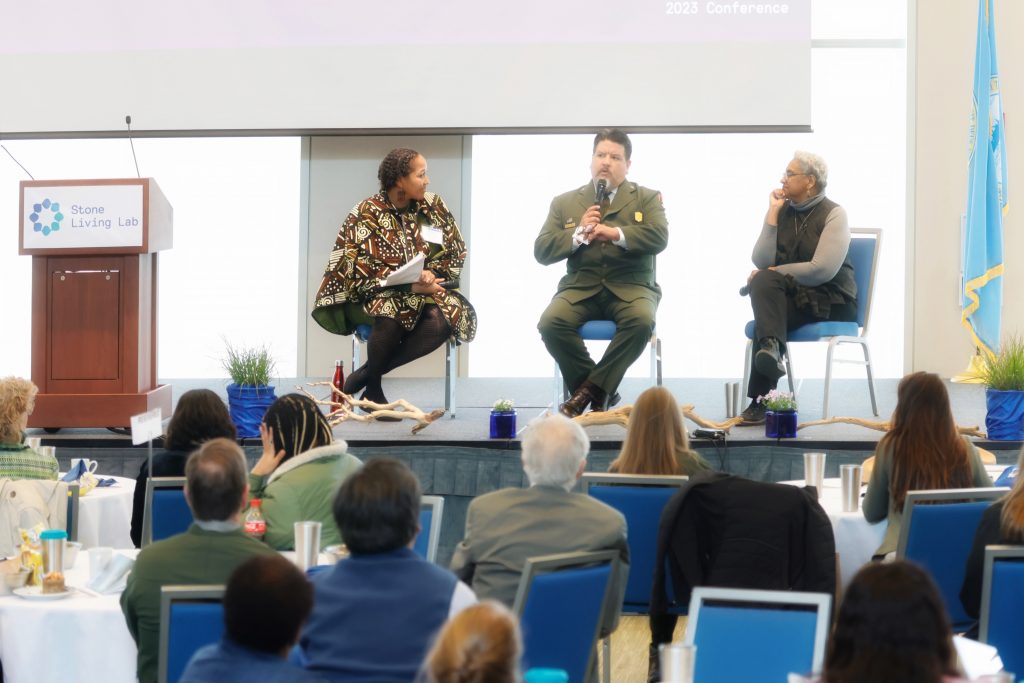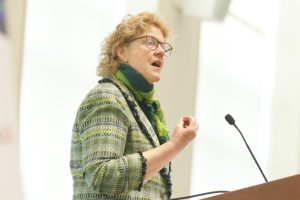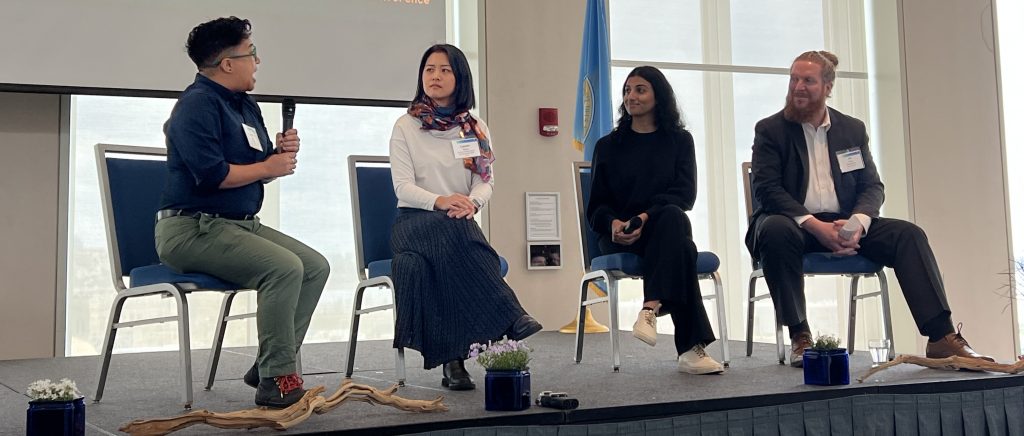Highlights from Stone Living Lab 2023 Conference


If you were unable to attend the Stone Living Lab’s 2023 conference, Nature-Based Coastal Resilience in Urban Settings, or would like to hear our plenary speakers again, you can now watch the recordings of our plenary talks and panels! For the 250+ participants and attendees, the conference offered a bounty of ideas and inspiration for how we can all join together to create a future where people work with nature to make coastal regions resilient and adaptive to climate change while enhancing and beautifying both natural and built environments.
Day 1 features an Indigenous Knowledge Fireside Chat, a conversation with National Park Service Director Charles F. “Chuck” Sams III and Elizabeth Solomon, of the Massachusett Tribe at Ponkapoag. The chat was moderated by the City of Boston’s Chief of Energy, Environment, and Open Space Rev. Mariama White-Hammond. Director Sams, the National Park Service’s 19th Director and the first indigenous person to serve in that role, is Cayuse and Walla Walla and is an enrolled member of the Confederated Tribes of the Umatilla Indian Reservation in Northeast Oregon where he grew up. He also has blood ties to the Cocopah Tribe and Yankton Sioux of Fort Peck. Elizabeth Solomon serves on the Stone Living Lab’s Executive Committee, representing indigenous interests and guiding the Lab’s work.

Conference attendees listen to National Park Service Director Charles Sams, Massachusett Tribe at Ponkapoag Elder Elizabeth Solomon, and moderator Rev. Mariama White-Hammond of the city of Boston during Day 1’s Indigenous Knowledge Fireside Panel.
A highlight of the conference, this conversation offered a deep exploration of indigenous traditional ecological knowledge, ways of knowing and living gained from thousands of years of knowledge and practice. “It really was the earth making its own decision about what it was going to do,’’ Director Sams says during the conversation, “but that being said, our relationship with the land told us how we were to interact with it and to adapt to it.’’
We were also honored on Day 1 to hear from Massachusetts’ first-ever cabinet-level Climate Chief, Melissa Hoffer. Chief Hoffer outlined the vision that she, Governor Maura Healey, Lieutenant

Melissa Hoffer, Massachusetts’ first ever Climate Chief, opens day 1 of the conference with a keynote address.
Governor Kim Driscoll, and their administration share to make the Bay State’s coastline and coastal communities more resilient to climate change, including quickly and aggressively reducing carbon emissions and the environmental damage they cause. Drawing close connections between human and ecological resilience, Chief Hoffer describes the need for “an immediate resetting of governmental and private sector priorities and resources.’’ She also highlights the importance of moving ahead rapidly with “low-cost/low-regrets activities” to build resilience to climate change, like protecting ecologically critical salt marshes, as stakeholders gain more clarity about the timing and extent of future climate impacts and the most effective, sustainable approaches to addressing them.
Day 2 features our panel discussion “Co-Lab-Oration: How Three Climate Labs in Boston and New York City are Approaching Their Work.” Moderated by Kimberly Lucas ofNortheastern University’s School of Public Policy and Urban Affairs, this discussion offers a rich, nuanced look at the critical role of partnerships and collaboration in climate resiliency research and implementation from the perspective of three “living laboratories.” Panelists were Stone Living Lab Managing Director Joe Christo; Sheetal Shah, Operations & Engagement Lead at the Urban Ocean Lab in New York City; and Lauren Wang, Director of Climate Programs at The Trust for Governors Island in New York City. While all three labs have their own unique focus, geography, mission, and activities, they also complement each other so well, and the Urban Ocean Lab’s vision statement is one that captures the conference’s theme perfectly: That Boston, New York, and all coastal cities will be “climate-ready, implementing rigorous and world-leading climate and ocean policy solutions, ensuring environmental justice for coastal communities, and serving as models for state and federal policy change.’’

Day 2’s Co-Lab-Oration panel participants (left to right): Moderator Kimberly Lucas of Northeastern University’s School of Public Policy and Urban Affairs, Lauren Wang of The Trust for Governors Island, Sheetal Shah, of the Urban Ocean Lab, and Stone Living Lab Managing Director Joe Christo.

 On behalf of all our partners and generous sponsors, the Stone Living Lab would again like to thank each and every one of our speakers and presenters and everyone who participated in “Nature-Based Coastal Resilience in Urban Settings’’ and shared your knowledge, insights, and positive energy for making sustainable change. We look forward to our next Stone Living Lab conference in 2025, which we are already discussing and planning, and we invite and welcome your suggestions for topics and speakers here.
On behalf of all our partners and generous sponsors, the Stone Living Lab would again like to thank each and every one of our speakers and presenters and everyone who participated in “Nature-Based Coastal Resilience in Urban Settings’’ and shared your knowledge, insights, and positive energy for making sustainable change. We look forward to our next Stone Living Lab conference in 2025, which we are already discussing and planning, and we invite and welcome your suggestions for topics and speakers here.